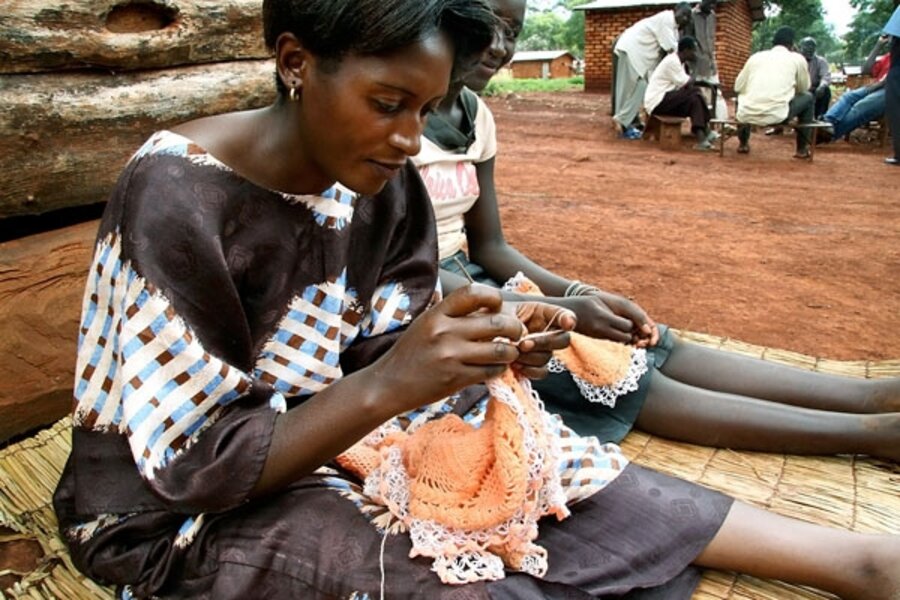Changing gender roles in Tanzania’s refugee camps
Loading...
The men sat around in a circle of chairs and benches, smoking, chatting, and playing board games. Their wives spent hours cooking, cleaning, tending kids, and hauling five-gallon water buckets from the pump on their heads. Men had first, last, and nicknames. Women were known by their kids: Mama Grace, Mama Elisa, Mama Billy. The gender roles in Kanembwa refugee camp, in northwestern Tanzania, seemed plenty strict to me.But when six of Hassan's male friends joined me and translator Pablo Joseph for a discussion one afternoon in Kanembwa, the men were upset. Camp life had turned the traditional Congolese social order on its head, they said, and women were getting uppity."Her rights, she knows," said former human rights activist Dieudonn Mukucha, "her responsibilities, she forgets."The roots of the problem, as the men saw it, were three: First was Mobutu Sese Seko, Congo's kleptocratic, totalitarian ruler from 1965-1997. Under his regime, employment dried up, leaving men at home caring for children while women traveled farther and farther from home to sell produce from their gardens, or small craft objects they'd made, to support their families."Here, things were very, very bitter for we husbands," said Pierre Lokombe, a high school math teacher. "You are not respected at all, because the one who is looking for something to make you survive with your family is a woman."Second was the setup of the camps. In a United Nations refugee camp, heads of household aren't in charge of much. They get their food from the World Food Programme, their clothes from the UN, their kids' education at the discretion of aid groups and national governments. With all of this handed to them at the whims of others, the men said, there is little fathers can provide for their families.The third problem, they said, is education: especially the Gender Based Violence awareness programs provided by NGOs in the camps. These had filled women's heads with new ideas: their right not to be hit, for instance.
"The women seem to feel themselves more civilized than us," lamented Pierre.
I asked if the men felt emasculated by camp life. Absolutely, they said. They were good-humored about it, explaining Congolese traditions, the role of agriculture and hunting. At points, Pablo couldn't resist jumping in with commentary."African culture was sometimes terrible. Sometimes women were becoming like luggages, put aside," he said.
Even today, said Pablo, it's not uncommon in Congo and Tanzania for a woman to kneel on the ground, five steps distant from her husband, while he eats a meal, "to see if the husband gets trouble in chewing the food she prepared.... We are taking that as respect."
As we talked, the men were living in Kanembwa camp's "American Village," basically a holding area for those who've been approved for a home in one of the Western nations that provide refugees with permanent homes, while they wait for visas. I wondered how their attitudes would fly in a few months, when they landed in Phoenix, or Oslo, or Sydney. The men said they were worried about this, too.On my return to Dar es Salaam, I told Richard Crothers, Tanzania director for the nonprofit International Rescue Committee which leads the Gender Based Violence workshops in the camps, what the men had said about their changing relationships with their wives.He was pleased. In a lot of ways, he said, over the past decade the camps in northwestern Tanzania have become more progressive than Tanzanian society in general, as refugee communities have absorbed NGOs' messages about domestic violence and women's rights.
"They've just been a captive audience, so we've been able to hit them over the head with it," he says.
There was, of course, some cognitive dissonance to my conversation with the men in the camp, because they were talking to a woman reporter. A woman, moreover, who had three things they craved: freedom to leave the camp, a home to return to, and a forum in which to raise the problems frustrating them and other refugees worldwide.So they had lots of questions for me: Dieudonn had heard that in America, women thought they were above men, and he wanted to know why. He wondered, too, how I had convinced my husband to let me come to Tanzania, and whether he would be jealous when he learned I had been talking with all of them. This drew belly laughs, all around. Travel for this project's Africa reporting was funded in part by a grant from The Pulitzer Center on Crisis Reporting.





